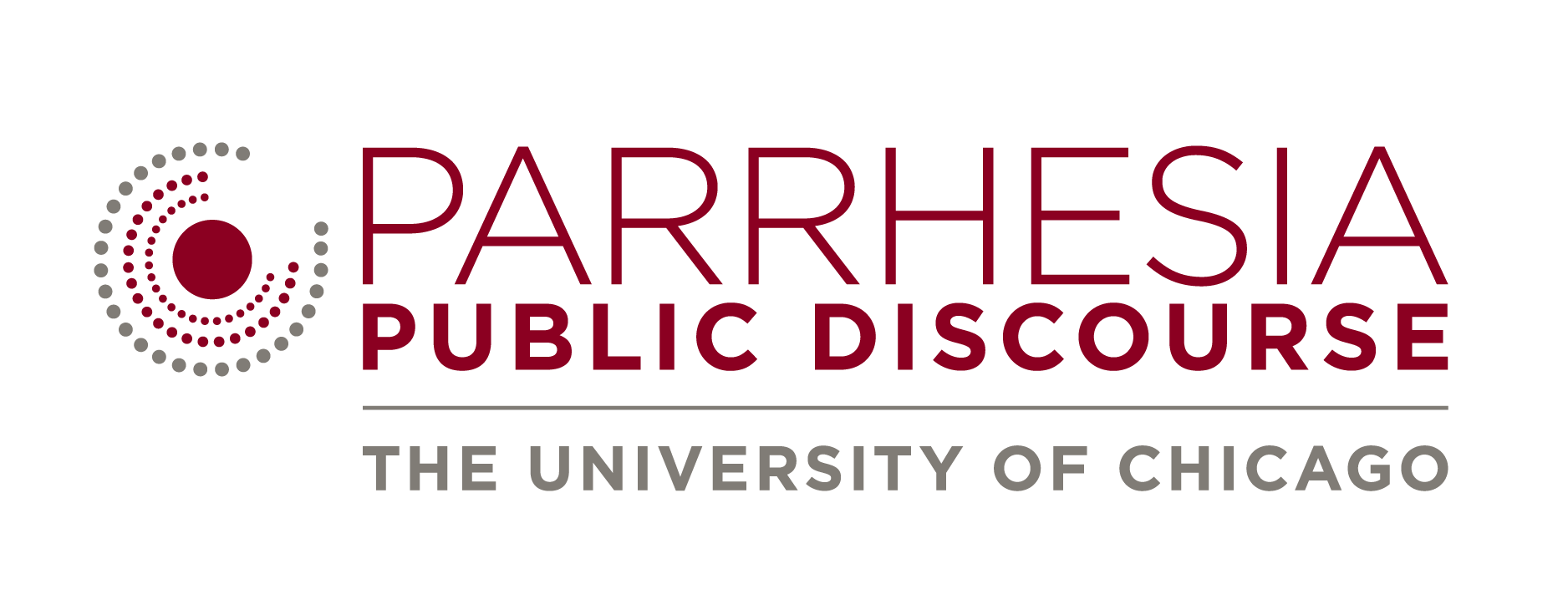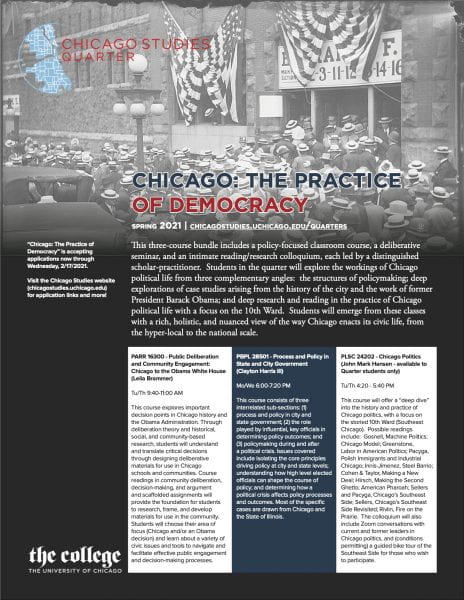Fall 2021 Courses
PARR 13000 - Public Speaking: Theory and Practice
Public Speaking: Theory and Practice emphasizes clear, direct, and concise presentation of complex, specialized, or controversial ideas. Through the study of rhetorical theory and examination of speeches and other public discourse, the course prepares students to communicate in a variety of academic, professional, and civic contexts. Course assignments and exercises actively engage students in the rhetorical process of research, evidence evaluation, argument construction, audience analysis, and presentation preparation and delivery. The course includes three outside of class speaking sessions to be arranged in consultation with students.
Winter 2022 Courses
PARR 14100 - Rhetorics of Race and Reconciliation in South Africa: The Struggle Against Apartheid
Apartheid was an institutionalized system of racial segregation that has become infamous for the systematic nature of its racial oppression and its violence. Apartheid defined the social space of South Africa – Apartheid policies dictated people’s identities, their social relations, where they lived and went to school, and whom they got to marry. This course examines the rhetorical construction of race that served as the underpinning to Apartheid segregation. In particular, students will consider the way that social space was organized and policed in South Africa in order to fulfill the fallacious logic of “separate development.” Yet even as South Africa provides a crucial example of systemic racism, it is also a powerful example of successful struggle against formal policies of segregation, and this course will explore the significant international mobilization against Apartheid. The course will finish by evaluating the work of South Africa’s Truth and Reconciliation Commission (TRC), which sought to create conditions for South Africans to confront the violent legacy of Apartheid, while also seeking to build a new nation out of South Africa’s deep divisions and conflicts. Students will produce two major analysis papers for the course: one on apartheid/the anti-apartheid struggle, and another examining the efficacy of the TRC. The final assignment will be a multi-modal group project exploring connections between structural racism in South Africa and the US.
PARR 14800 - Rhetoric and Rights: Examining the Dynamics of Legal Reasoning
As James Boyd White observes, the practice of law is intrinsically rhetorical. The meaning of law, which arises out of particular social and cultural circumstances, is both contingent and negotiated. Legal work, at its core, is therefore a dynamic process of argument and reasoning where various actors, from lawyers to judges to politicians to activists, continually seek to define and contest legal norms and principles. This course seeks to examine the rhetorical dynamics of legal arguments, both in terms of identifying legal topoi/commonplaces and doing comparative work evaluating how those topoi/commonplaces shift across cultural contexts. Students will examine how various supreme court cases focusing on basic rights issues, from freedom of speech, the right to privacy, religious rights, and more, are argued. They will also compare how those same issues are adjudicated differently by South Africa’s constitutional court. Students will then translate that analytical work into supreme court briefs, where, working in groups, they will present arguments on a case of their choosing in a final moot court project. In addition to presenting briefs, students will also serve as supreme court “justices” and will write a justification for their decision on a specific case presented by their classmates. Students will also have an opportunity to interact with relevant legal experts based in Chicago and Johannesburg.
PARR 18100 - Fearless Speech: Radicals, Revolutionaries, and Social Movements
Grounded in freedom of expression and rhetorical theory from Aristotle to Foucault, this course examines fearless speech from a variety of speakers and contexts. The primary focus of the course is speaking truth to power and the potential it holds for creating new meaning, altering discourse surrounding issues, and motivating social, political, and structural change. Engaging these questions through the lens of rhetorical theory places emphasis on how context, issues, and movements can shape and be shaped by public discourse. Particular attention to social media and contemporary social movements and their influences and they shape understanding and practice of speech and social change. Students will gain an understanding of rhetorical theory and test and refine that theory through close textual analyses of cases of courageous, contentious, and counter speech. Readings will include exemplar speech and rhetorical theory and criticism to inform and provide method for examination of the texts and the practices. Students will complete rhetorical analyses of speech and a position paper on rhetorical theory.
Courses From Past Academic Years
PARR 14300 - Traversing Borders: The Rhetoric of Immigration
Borders are not simply things – i.e. physical boundaries; rather, they are symbolic constructions that manifest in multiple forms- from language, to dress, to appearance – with the aim of distinguishing insider from outsider, those who belong from those who do not. Both the physical and symbolic borders of citizenship are proliferating, with the result that border-crossings of various kinds are becoming more dangerous. This course will examine the rhetorical construction of borders in the US and other parts of the world, including Europe and South Africa, through analysis of official documents, speeches, and news accounts. The course will also consider the way that migrant rights groups, through their activism, challenge the border logic of citizenship and seek to orient an understanding of citizenship toward a global context. The major assignments for this course will include a rhetorical analysis of relevant public discourse (speeches, social media, examples of activism) related to immigration debates in the US or abroad, as well as a public online forum that will focus on immigrant rights issues.
PARR 15000 - Political Rhetoric: Speeches, Campaigns, and Protests
By critically examining historical and contemporary political discourse the class will attempt to elucidate how symbolic action creates meaning and shapes political positions as well as policy decisions. Utilizing rhetorical theory, students will analyze oral, written, and digital public communication aimed at influencing social, political, legal, and religious issues and institutions. It will explore topics such as the role of power and identity in political communication, the ethical dimension of public discourse, and the concept of a free and open public sphere. Through readings, discussions, case studies, and analytical assignments, students will learn to critically examine as well as to produce effective public discourse.
PARR 15200 - Political Rhetoric: Presidential Primary 2020
Rhetorical theory and analysis of political discourse provides a foundation for active engagement with the political rhetoric of 2020 Presidential Primary. Readings, case studies, discussions, and assignments will prepare students to examine and synchronously produce campaign communication, such as speeches, social media posts, and communication plans, in response to the events of the 2020 Presidential Primary.
PARR 15700 - Pandemic Politics: Deliberating Public Health
The Covid-19 pandemic underlines the importance of science in public life, as well as its contested nature. Science is crucial in helping us make sense of world, but translating scientific findings into the public sphere – which is defined by different standards of evidence, conflicting values and political agendas, and distrust of experts – presents a particular rhetorical challenge. Using HIV/AIDS and Covid-19 as case studies, this course will examine the way that public science is mediated through discourse. Students will study the background of the HIV/AIDS epidemic, the stigma that resulted, and the important role of activists and scientists in challenging that stigma and fighting for life-saving treatment. In particular, students will analyze AIDS denialism in South Africa, which threatened to undermine the country’s treatment program, and the role of activist groups in defending the work of medical experts. We will then use the public controversy over HIV/AIDS to critically assess the present conflict over Covid-19, with the aim of learning how to better support effective public deliberation of important scientific issues. The main assignment for the course will be an analysis project, focusing on relevant texts that students choose related to either the HIV/AIDS or Covid-19 case studies. The course will finish with a group project in which students develop a Covid-19 vaccine campaign.
PARR 16000 - Presidential Election 2020
An unprecedented Democratic primary and nomination sets the stage for the 59th U.S. Presidential election. Through a ring lecture, this course will examine the presidential campaign, election, and its immediate aftermath from a variety of disciplinary perspectives. Each week, a lecture delivered by faculty and other experts will be followed by a discussion section to integrate and synthesize the lectures, course materials, the election process, relevant current events, and the evolving campaigns. Students will be responsible for readings, written analysis assignments, and preparing for and actively participating in each week’s lecture and discussion.
PARR 16300/CHST 16300 - Public Deliberation and Community Engagement: Chicago to the Obama White House
This course explores important decision points in Chicago history and the Obama Administration. Through deliberation theory and historical, social, and community-based research, students will understand and translate critical decisions through designing deliberative materials for use in Chicago schools and communities. Public deliberation theory explores how to inform and engage citizens in inclusive informed deliberation and collective decision making. Course readings in community deliberation, decision-making, and argument and scaffolded assignments provide the foundation for students to research, frame, and develop materials for use in the community. Students will choose their area of focus-either Chicago and/or an Obama decision-and through peer testing and review learn about a variety of civic issues and tools to navigate and facilitate effective public engagement and decision-making processes.
Part of the Practice of Democracy Chicago Studies Quarter
PARR 16600 - Political Rhetoric: Presidential Inauguration, Transition, and Legislation
Presidential transitions provide unique and particularly robust moments for ritual, transition, and potential transformation on policies and politics. Through the lens of rhetorical theory on inaugurations, political communication, and transition, this course will examine the beginning of the Biden Presidency. Students will examine inaugural addresses, symbolic rituals, speeches, legislative agenda, and executive orders and directions executed in the first few weeks of the new administration. Course readings and discussions will review and synthesize relevant theory in relationship to emerging discourse, events, and proposals. In assignments, student will utilize theory to analyze and critique discourse and legislative and political developments.
Part of the Practice of Democracy Chicago Studies Quarter
PARR 21000 - Public Deliberation and Free Expression
Public deliberation theory explores how to engage citizens in inclusive, informed deliberation and collective decision-making on civic issues. In this course, students will study public deliberation theory, explore issues in free expression, and study frameworks designed to engage communities in learning about and discussing controversial issues. Drawing on what they’ve learned over the quarter, students will design and test frameworks to educate and engage college students in the principles and practice of free expression and open inquiry.

